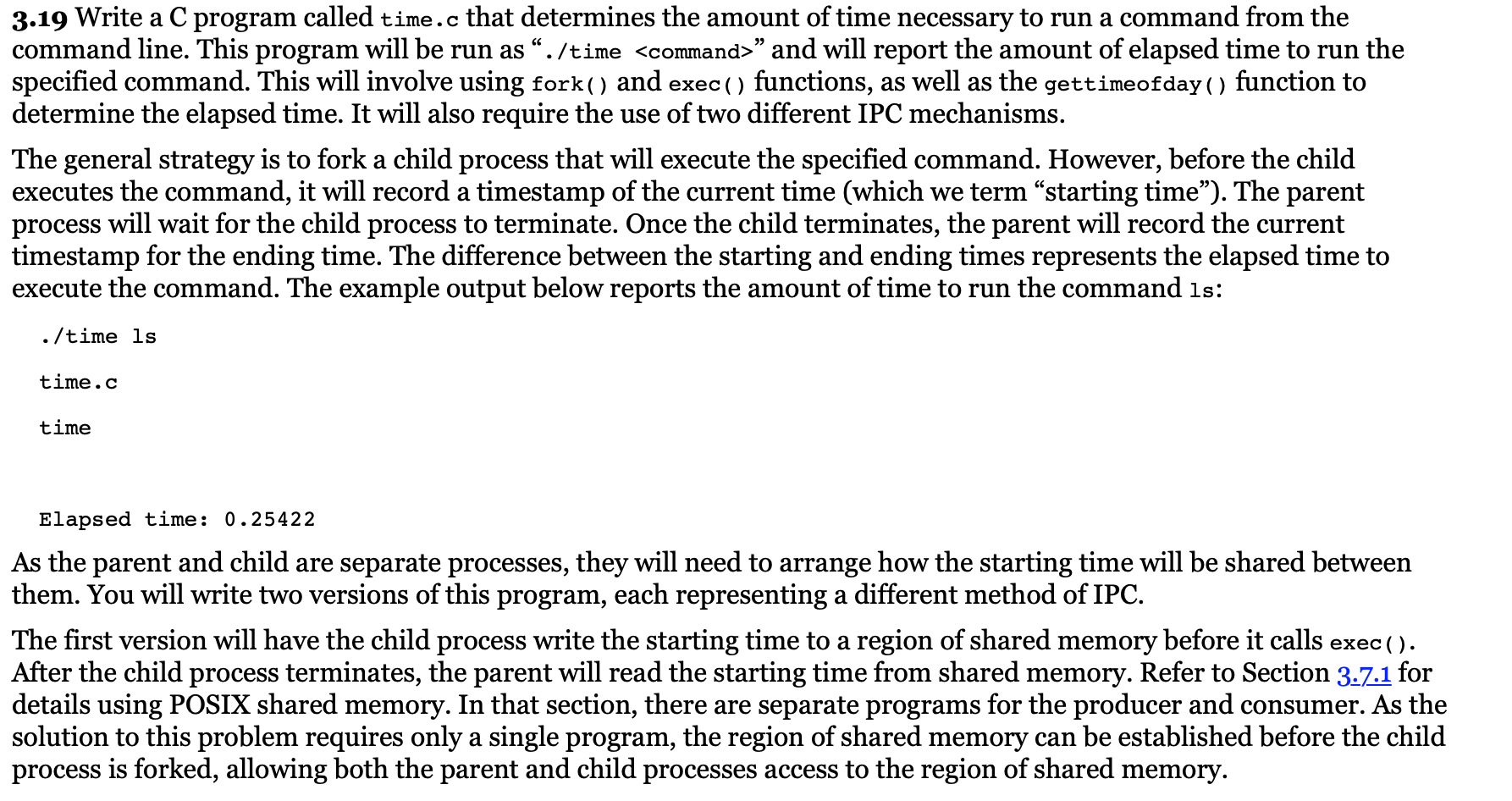
I only need first version
figure 3.7.1
#include
#include
#include
#include
#include
#include
#include
int main()
{
/* the size (in bytes) of shared memory object */
const int SIZE = 4096;
/* name of the shared memory object */
const char *name = "OS";
/* strings written to shared memory */
const char *message_0 = "Hello";
const char *message_1 = "World!";
/* shared memory file descriptor */
int fd;
/* pointer to shared memory obect */
char *ptr;
/* create the shared memory object */
fd = shm_open(name,O_CREAT | O_RDWR,0666);
/* configure the size of the shared memory object */
ftruncate(fd, SIZE);
/* memory map the shared memory object */
ptr = (char *)
mmap(0, SIZE, PROT_READ | PROT_WRITE, MAP_SHARED, fd, 0);
/* write to the shared memory object */
sprintf(ptr,"%s",message_0);
ptr += strlen(message_0);
sprintf(ptr,"%s",message_1);
ptr += strlen(message_1);
return 0;
}
3.19 Write a C program called time.c that determines the amount of time necessary to run a command from the command line. This program will be run as ./time
" and will report the amount of elapsed time to run the specified command. This will involve using fork() and exec() functions, as well as the gettimeofday() function to determine the elapsed time. It will also require the use of two different IPC mechanisms. The general strategy is to fork a child process that will execute the specified command. However, before the child executes the command, it will record a timestamp of the current time (which we term "starting time). The parent process will wait for the child process to terminate. Once the child terminates, the parent will record the current timestamp for the ending time. The difference between the starting and ending times represents the elapsed time to execute the command. The example output below reports the amount of time to run the command is: ./time ls time.c time Elapsed time: 0.25422 As the parent and child are separate processes, they will need to arrange how the starting time will be shared between them. You will write two versions of this program, each representing a different method of IPC. The first version will have the child process write the starting time to a region of shared memory before it calls exec(). After the child process terminates, the parent will read the starting time from shared memory. Refer to Section 3.7.1 for details using POSIX shared memory. In that section, there are separate programs for the producer and consumer. As the solution to this problem requires only a single program, the region of shared memory can be established before the child process is forked, allowing both the parent and child processes access to the region of shared memory. 3.19 Write a C program called time.c that determines the amount of time necessary to run a command from the command line. This program will be run as ./time " and will report the amount of elapsed time to run the specified command. This will involve using fork() and exec() functions, as well as the gettimeofday() function to determine the elapsed time. It will also require the use of two different IPC mechanisms. The general strategy is to fork a child process that will execute the specified command. However, before the child executes the command, it will record a timestamp of the current time (which we term "starting time). The parent process will wait for the child process to terminate. Once the child terminates, the parent will record the current timestamp for the ending time. The difference between the starting and ending times represents the elapsed time to execute the command. The example output below reports the amount of time to run the command is: ./time ls time.c time Elapsed time: 0.25422 As the parent and child are separate processes, they will need to arrange how the starting time will be shared between them. You will write two versions of this program, each representing a different method of IPC. The first version will have the child process write the starting time to a region of shared memory before it calls exec(). After the child process terminates, the parent will read the starting time from shared memory. Refer to Section 3.7.1 for details using POSIX shared memory. In that section, there are separate programs for the producer and consumer. As the solution to this problem requires only a single program, the region of shared memory can be established before the child process is forked, allowing both the parent and child processes access to the region of shared memory







